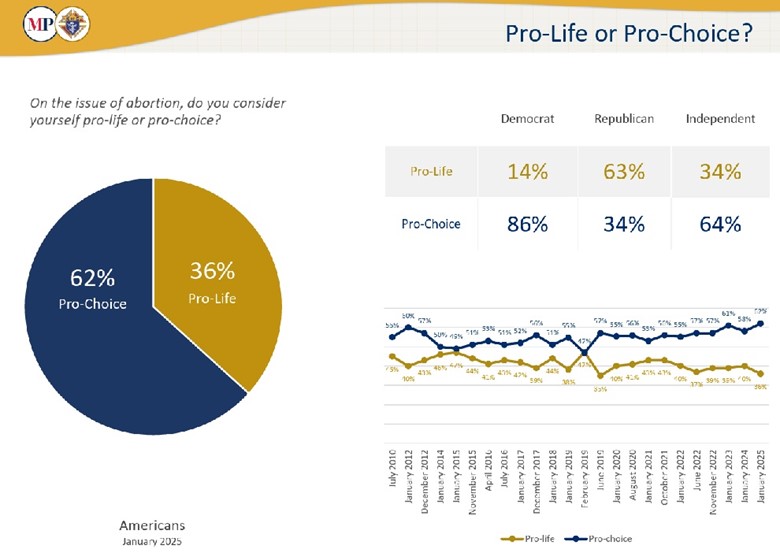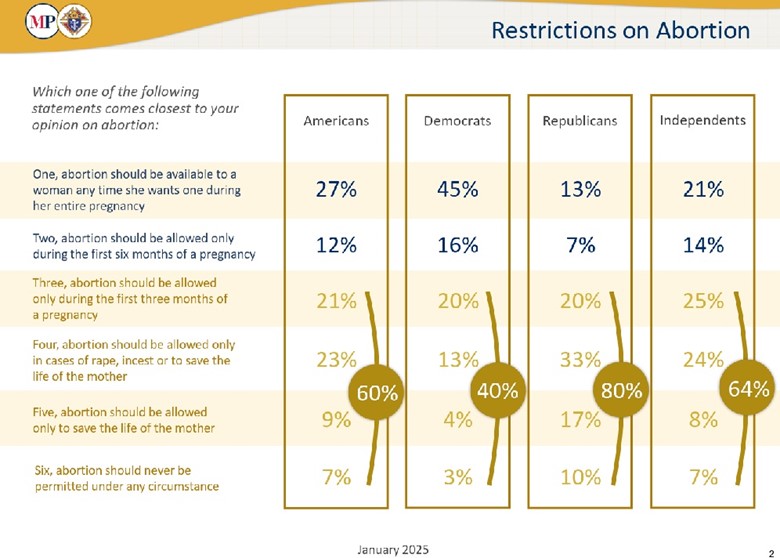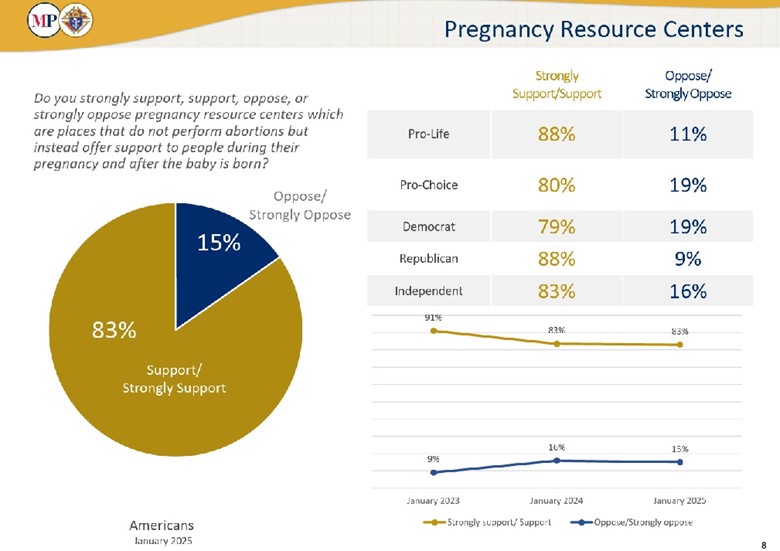While Americans remain divided over abortion, 83% agree on supporting pregnancy resource centers that provide aid to women during pregnancy and beyond. This broad consensus includes the majority of Pro-Choice respondents, highlighting a shared commitment to helping women rather than forcing a choice. Recognizing this overlap may transform the abortion debate into a conversation about support and care.
Whether you’re a believer in a woman’s Right to Choose or a preborn baby’s Right to Life, I have a question for you:
Is there any possibility of finding shared ground with those who hold the opposite view?
If you’ve spent meaningful time listening—really listening—to both sides of the debate, I wouldn’t blame you if your immediate answer is “absolutely not.”
Still, I’d like to ask you to step back from the philosophical debate for a moment and consider some recent research—specifically, a January 2025 poll conducted by the Marist Poll for the Knights of Columbus.
There are three key findings from this survey I want to share with you.
Two of them probably won’t surprise you.
But the third? It seems to contradict the first two entirely—almost as if it came from an entirely different group of respondents.
Yet all three insights came from the exact same participants.
And as I’ll explain shortly, that third finding—despite appearing contradictory—actually makes perfect sense. In fact, it may represent the very place where Right to Choose and Right to Life supporters can find meaningful common ground.
Let’s start with the first data set: a graph tracking American identification with either the Pro-Life or Pro-Choice label over the past 15 years.
Trendlines show a shift:

Over time, Americans have increasingly leaned toward identifying as Pro-Choice. That trend has only accelerated over the last five years.
But even that graph doesn’t fully capture the extent of the shift—something that becomes clearer when we look at the second data point.
In the same poll, while 36% of Americans identified as Pro-Life, only 7% of Americans said they believe abortion should never be permitted under any circumstance.

Think about that for a second.
The core Pro-Life stance is that abortion should not be permitted under any condition. If just 7% of Americans hold that belief, we can conclude that fewer than 1 in 10 Americans actually embrace the foundational Pro-Life position.
Interesting, isn’t it?
But now we get to the third—and most unexpected—data point.
Participants were asked:
“Do you strongly support, support, oppose or strongly oppose pregnancy resource centers, which are places that do not perform abortions but instead offer support to people during their pregnancy and after the baby is born?”
Given that pregnancy resource centers are clearly aligned with the Pro-Life camp—since they do not perform abortions—you might expect support for them to hover around the same level as general Pro-Life identification (36%).
But that’s not what the data showed.
Not even close.
A full 83% of Americans—including 80% of self-identified Pro-Choice respondents—said they either “strongly support” or “support” pregnancy resource centers.

Let that sink in.
If you’re someone who primarily engages with Pro-Life media, this result might come as a surprise. But for me, it makes perfect sense.
Why?
Because I know people who identify as Pro-Choice—and I know they wouldn’t want a woman facing an unexpected pregnancy, who actually wants to carry her child to term, to feel like abortion is her only option.
And Right to Life believers agree on that wholeheartedly.
That’s the bridge. That’s the shared value.
It’s the belief that no woman should feel cornered into an abortion because she lacks support.
And this is where both camps—Pro-Life and Pro-Choice—can stand together.
There’s real potential for collaboration here.
And data backs that up.
A 2023 study titled “The Effects of Abortion Decision Rightness and Decision Type on Women’s Satisfaction and Mental Health” (https://pubmed.ncbi.nlm.nih.gov/37303450/) surveyed 1,000 women, 226 of whom reported a history of abortion.
Here’s what they found:
33% described their abortion as “wanted.”
43% said it was “accepted, but inconsistent with their values or preferences.”
24% reported it as “unwanted or coerced.”
And the key insight from the study?
“60% of the women reported that they would have preferred to give birth if they had received more support from others or had more financial security.”
Now, consider that alongside the Marist poll, which found 83% support for pregnancy resource centers—even among 80% of Pro-Choice respondents.
Do you see it?
There’s a real, tangible opportunity for Right to Life and Right to Choose supporters to come together—to ensure that women who want to carry their pregnancies to term are able to do so with dignity, support, and security.
More to come…
Warm regards,
Brett Attebery

